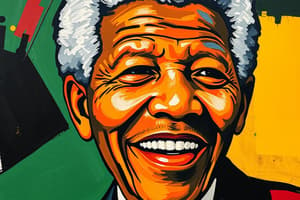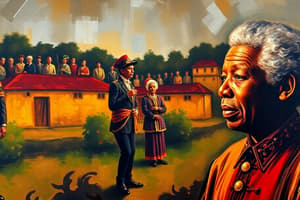Podcast
Questions and Answers
What title did Nelson Mandela earn for his dedication to non-violent struggle for freedom and democracy?
What title did Nelson Mandela earn for his dedication to non-violent struggle for freedom and democracy?
Father of the Nation
Where was Nelson Mandela imprisoned from 1963 to 1990?
Where was Nelson Mandela imprisoned from 1963 to 1990?
Robben Island
What year was Nelson Mandela released from prison?
What year was Nelson Mandela released from prison?
1990
What did Nelson Mandela become in 1994, marking a significant moment in his legacy?
What did Nelson Mandela become in 1994, marking a significant moment in his legacy?
What political party did Nelson Mandela join in 1942?
What political party did Nelson Mandela join in 1942?
Where was Nelson Mandela born?
Where was Nelson Mandela born?
What was Nelson Mandela's legacy?
What was Nelson Mandela's legacy?
What was Mandela's commitment during his presidency?
What was Mandela's commitment during his presidency?
What commission did Mandela establish during his presidency?
What commission did Mandela establish during his presidency?
What global awards did Mandela receive?
What global awards did Mandela receive?
What did Mandela's life story serve as a reminder of?
What did Mandela's life story serve as a reminder of?
What impact did Mandela have on the world?
What impact did Mandela have on the world?
Flashcards are hidden until you start studying
Study Notes
Nelson Mandela: A Legacy of Hope and Unity
Nelson Mandela, born Rolihlahla Mandela on July 18, 1918, in the Eastern Cape of South Africa, became a global icon of peace, justice, and reconciliation. His remarkable journey from a young freedom fighter to the first democratically elected president of South Africa in 1994, cemented his legacy as a revered and influential figure.
Early Life and Political Involvement
Mandela was educated at Fort Hare University, where he became immersed in the political movements of the time. He joined the African National Congress (ANC) in 1942 and quickly became a prominent figure in its struggle against the apartheid regime. He was repeatedly arrested for political activities, and in 1963, he was sentenced to life imprisonment and sent to Robben Island, where he would remain until 1990.
The Rise of a Global Icon
While incarcerated, Mandela's image grew around the world as a symbol of resistance against apartheid. His unwavering dedication to non-violent struggle for freedom and democracy earned him the title "Father of the Nation" in South Africa and the respect of people worldwide. In 1990, he was released from prison, and he embarked on a journey that would lead to the end of apartheid and the establishment of a democratic South Africa.
The End of Apartheid and the Road to Democracy
Mandela and the ANC, working in collaboration with South Africa's first democratically elected president F.W. de Klerk, negotiated an end to apartheid and the transition to a new constitutional order that protected the rights of all South Africans. In April 1994, South Africa held its first democratic elections, and Mandela was elected as the country's first black president.
Mandela's Presidency and Legacy
As president, Mandela worked tirelessly to unite South Africans, promote reconciliation, and build a new nation. He established the Truth and Reconciliation Commission to address the crimes committed during apartheid and foster national unity. His presidency was also marked by the adoption of a new constitution, the promotion of education, and the expansion of access to basic services, such as water and electricity.
Mandela's legacy extends far beyond South Africa. He was a global advocate for peace, justice, and human rights, and he received numerous prestigious awards, including the Nobel Peace Prize in 1993. His enduring impact on the world was such that he was recognized as a global icon who inspired hope and change in countless lives.
Conclusion
Nelson Mandela's legacy is one of hope, unity, and resilience. His courage, determination, and unwavering commitment to justice and equality have left an indelible mark on the world. Mandela's life story serves as a reminder that even in the face of great adversity, it is possible to transform the world through peaceful means and unyielding dedication to the cause of justice. His legacy continues to inspire generations, and his commitment to unity and equality remains as relevant today as it was in his time.
Studying That Suits You
Use AI to generate personalized quizzes and flashcards to suit your learning preferences.




